7 start with N start with N
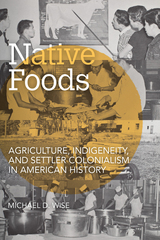
Combining original historical research with interdisciplinary perspectives and informed by the work of Indigenous food sovereignty advocates and activists, this study sheds new light on the historical roles of Native American cuisine in American history and the significance of ongoing colonial processes in present-day discussions about the place of Native foods and Native history in our evolving worlds of taste, justice, and politics.
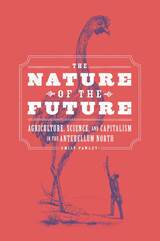
The nostalgic mist surrounding farms can make it hard to write their history, encrusting them with stereotypical rural virtues and unrealistically separating them from markets, capitalism, and urban influences. The Nature of the Future dispels this mist, focusing on a place and period of enormous agricultural vitality—antebellum New York State—to examine the largest, most diverse, and most active scientific community in nineteenth-century America. Emily Pawley shows how “improving” farmers practiced a science where conflicting visions of the future landscape appeared and evaporated in quick succession. Drawing from US history, environmental history, and the history of science, and extensively mining a wealth of antebellum agricultural publications, The Nature of the Future reveals how improvers transformed American landscapes and American ideas of expertise, success, and exploitation from the ground up.
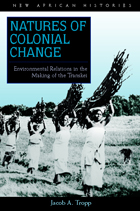
In this groundbreaking study, Jacob A. Tropp explores the interconnections between negotiations over the environment and an emerging colonial relationship in a particular South African context—the Transkei—subsequently the largest of the notorious “homelands” under apartheid.
In the late nineteenth century, South Africa’s Cape Colony completed its incorporation of the area beyond the Kei River, known as the Transkei, and began transforming the region into a labor reserve. It simultaneously restructured popular access to local forests, reserving those resources for the benefit of the white settler economy. This placed new constraints on local Africans in accessing resources for agriculture, livestock management, hunting, building materials, fuel, medicine, and ritual practices.
Drawing from a diverse array of oral and written sources, Tropp reveals how bargaining over resources—between and among colonial officials, chiefs and headmen, and local African men and women—was interwoven with major changes in local political authority, gendered economic relations, and cultural practices as well as with intense struggles over the very meaning and scope of colonial rule itself.
Natures of Colonial Change sheds new light on the colonial era in the Transkei by looking at significant yet neglected dimensions of this history: how both “colonizing” and “colonized” groups negotiated environmental access and how such negotiations helped shape the broader making and meaning of life in the new colonial order.
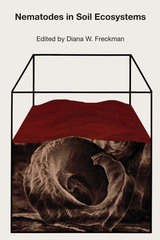
Many species of the phylum Nematoda, the nonsegmented worms, play an important role as animal or plant parasites; most species are active contributors to the decomposition cycle in soil ecosystems, but the details of that contribution are just beginning to be understood.
Agricultural nematologists, vitally involved in the study of the methodology, taxonomy, and biology of the species due to the direct relationship between crop yield and the size of plant-parasitic nematode populations, have provided much information about the nematodes. More recently, ecologists have contributed additional data on the structure and function of the total soil community, including energy flow and nutrient cycling, and have examined the critical and multifaceted role of soil nematodes in such communities. Nematodes in Soil Ecosystems provides a valuable synthesis of significant research in this area and may stimulate further important communication between the agricultural and ecological branches of nematode research.
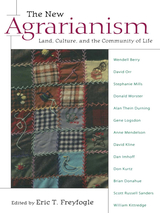
The engaging writings gathered in this new book explore an important but little-publicized movement in American culture -- the marked resurgence of agrarian practices and values in rural areas, suburbs, and even cities. It is a movement that in widely varied ways is attempting to strengthen society's roots in the land while bringing greater health to families, neighborhoods, and communities. The New Agrarianism vividly displays the movement's breadth and vigor, with selections by such award-winning writers as Wendell Berry, William Kittredge, Stephanie Mills, David Orr, Scott Russell Sanders, and Donald Worster.
As editor Eric Freyfogle observes in his stimulating and original introduction, agrarianism is properly conceived in broad terms, as reaching beyond food production to include a wide constellation of ideals, loyalties, sentiments, and hopes. It is a temperament and a moral orientation, he explains, as well as a suite of diverse economic practices -- all based on the insistent truth that people everywhere are part of the land community, as dependent as other life on its fertility and just as shaped by its mysteries and possibilities.
The writings included here have been chosen for their engaging narratives as well as their depiction of the New Agrarianism's broad scope. Many of the selections illustrate agrarian practitioners in action -- restoring prairies, promoting community forests and farms, reducing resource consumption, reshaping the built environment. Other selections offer pointed critiques of contemporary American culture and its market-driven, resource-depleting competitiveness. Together, they reveal what Freyfogle identifies as the heart and soul of the New Agrarianism: its yearning to regain society's connections to the land and its quest to help craft a more land-based and enduring set of shared values.
The New Agrarianism offers a compelling vision of this hopeful new way of living. It is an essential book for social critics, community activists, organic gardeners, conservationists, and all those seeking to forge sustaining ties with the entire community of life.
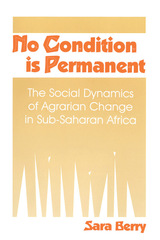
“No condition is permanent,” a popular West African slogan, expresses Sara S. Berry’s theme: the obstacles to African agrarian development never stay the same. Her book explores the complex way African economy and society are tied to issues of land and labor, offering a comparative study of agrarian change in four rural economies in sub-Saharan Africa, including two that experienced long periods of expanding peasant production for export (southern Ghana and southwestern Nigeria), a settler economy (central Kenya), and a rural labor reserve (northeastern Zambia).
The resources available to African farmers have changed dramatically over the course of the twentieth century. Berry asserts that the ways resources are acquired and used are shaped not only by the incorporation of a rural area into colonial (later national) and global political economies, but also by conflicts over culture, power, and property within and beyond rural communities. By tracing the various debates over rights to resources and their effects on agricultural production and farmers’ uses of income, Berry presents agrarian change as a series of on-going processes rather than a set of discrete “successes” and “failures.”
No Condition Is Permanent enriches the discussion of agrarian development by showing how multidisciplinary studies of local agrarian history can constructively contribute to development policy. The book is a contribution both to African agrarian history and to debates over the role of agriculture in Africa’s recent economic crises.

Not by Timber Alone presents the findings of the Harvard Institute for International Development study, commissioned by the International Tropical Timber Organization, that examined the economic value of tropical hardwood forests as productive living systems and the potential for their multiple use management.
READERS
Browse our collection.
PUBLISHERS
See BiblioVault's publisher services.
STUDENT SERVICES
Files for college accessibility offices.
UChicago Accessibility Resources
home | accessibility | search | about | contact us
BiblioVault ® 2001 - 2024
The University of Chicago Press









